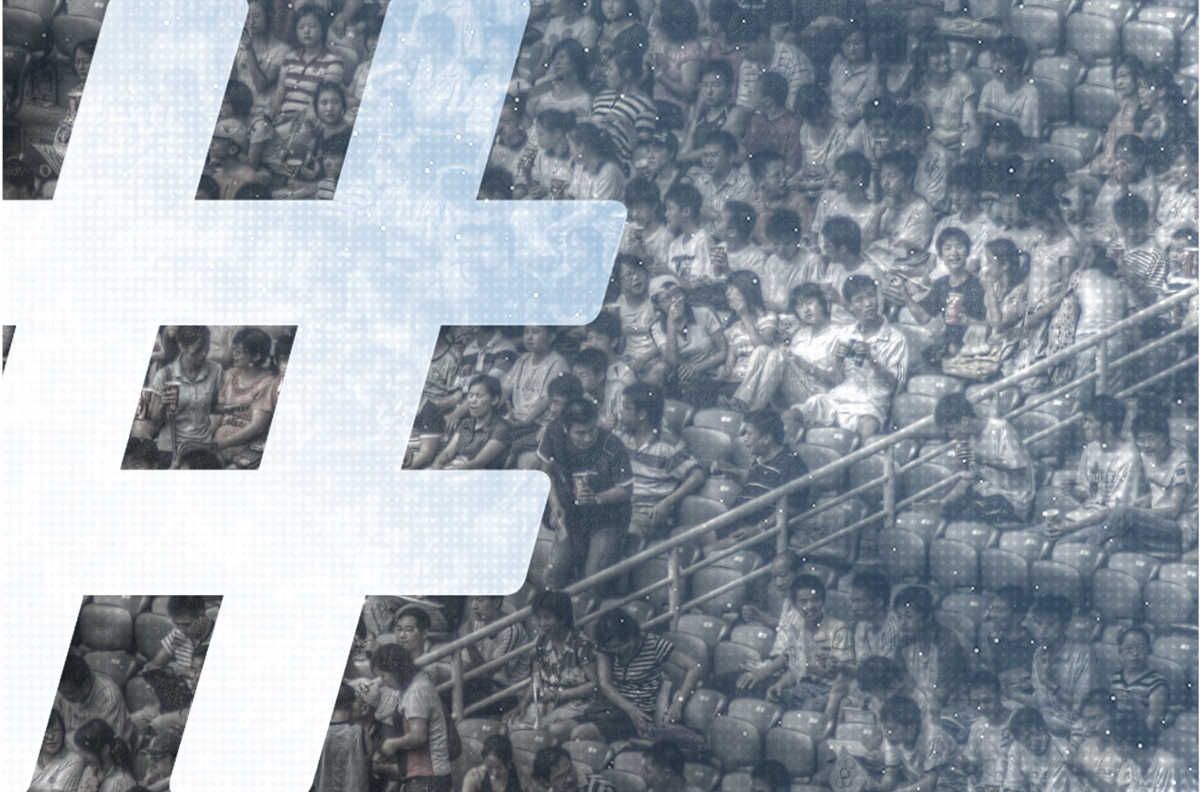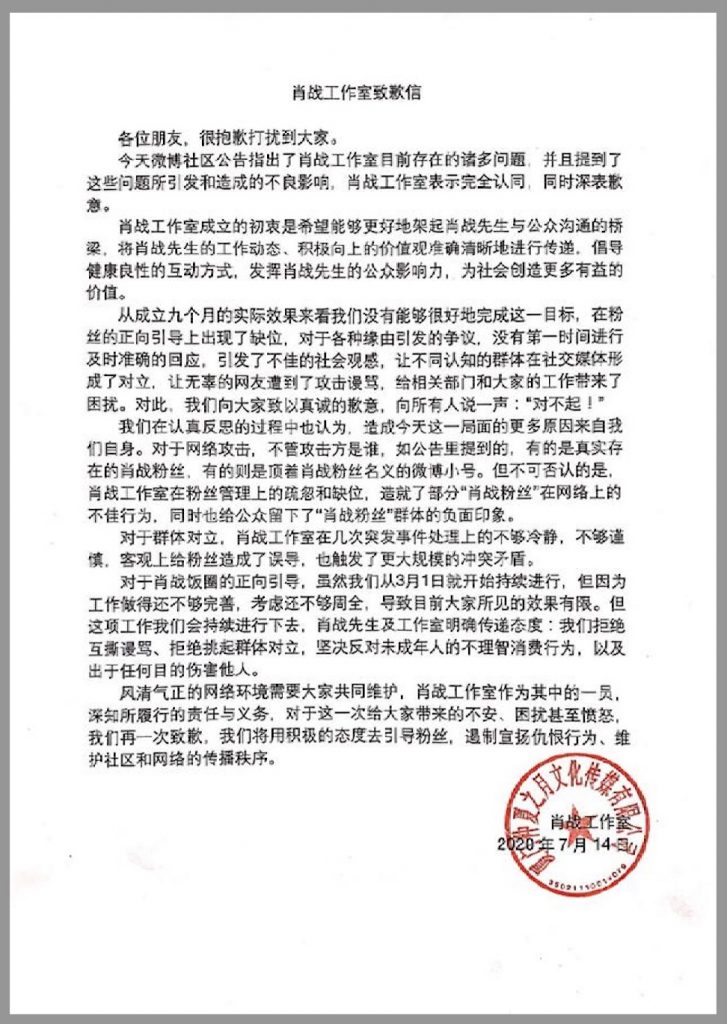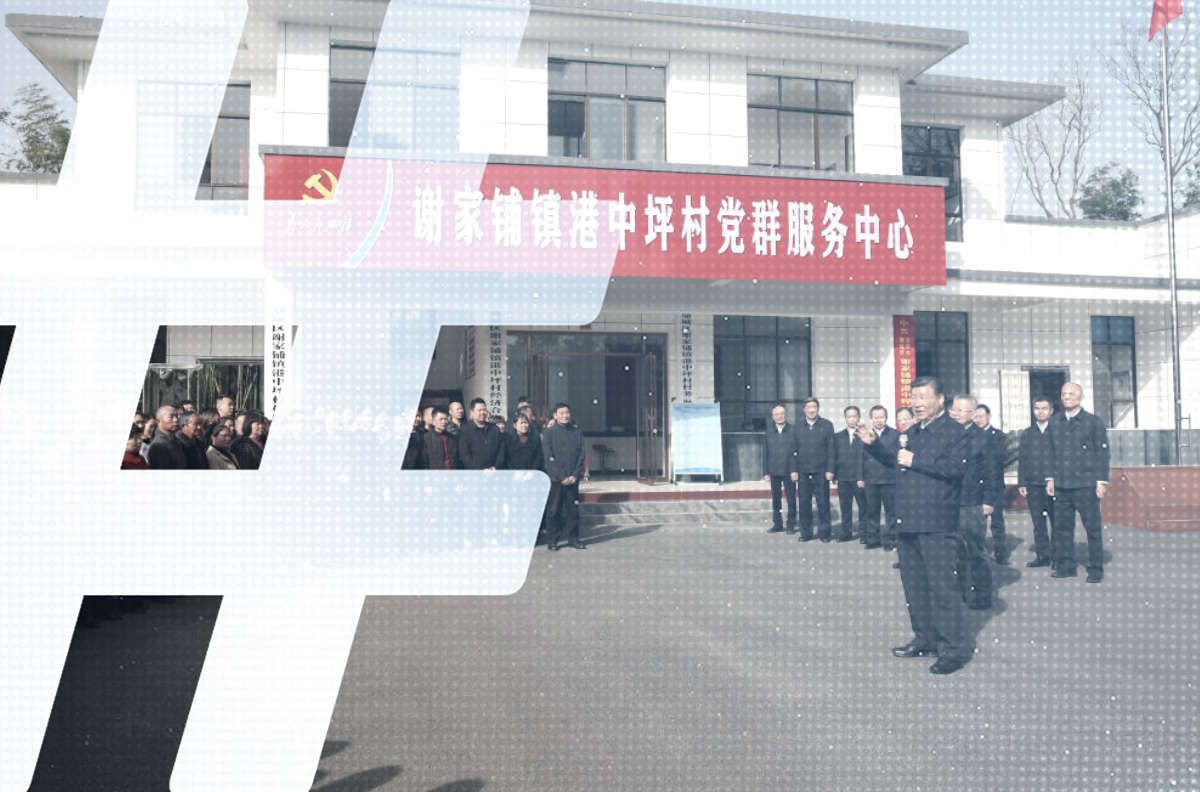Headlines and Hashtags
Fandoms in the Crosshairs

On August 27, the Cyberspace Administration of China (CAC), the chief body for internet regulation and censorship, announced new measures that state media referred to as a “heightened crackdown” on China’s so-called “fandom culture,” or fanquan wenhua (饭圈文化). These measures capped a series of actions by the Chinese government this year to tighten control of private internet companies – including a punishing anti-trust fine for Alibaba, the suspension of 25 mobile apps operated by ride-hailing giant Didi Global, restrictions on China’s educational technology market, online gaming curbs and draft regulations limiting the use of “algorithmic promotional services.”
Since the internet clean-up campaign was formally launched by the CAC back in May, much coverage in the state media has focused on the above-mentioned actions as a matter of moral urgency. The official discourse from the CAC has stressed the need to “strengthen moral construction in the online space” (加强网络空间道德建设). And fandom culture in particular has been characterized as an attack on the “moral bottom line,” “poisoning China’s youth” (毒害青少年).
While there certainly are any number of legitimate concerns in Chinese cyberspace that might be pursued in the public interest, from protecting privacy rights and data security, to grappling with problems like cyber-bullying and doxing, a closer look at the official discourse around these moves to “cleanse” China’s internet elucidates a clear underlying objective – the re-consolidation of the Chinese Communist Party’s dominance over ideology and public opinion in order to maintain political control.
Moves in recent weeks and months to curb the influence of fandom culture are a clear case in point. For many Chinese youth, fandom culture has been a rare arena of choice, self-identification and community formation. For the Party-state, however, these online communities, although formed around shared infatuations that can seem effete and shallow, pose a real challenge to the CCP’s control of ideas and agendas.
From Idol Worship to Shared Community
Fandom culture can be traced back to the idol worship of the 1980s and 1990s, following on trends in South Korea and Japan. In the past, idols were selected and produced by talent scouts or TV shows and then promoted through traditional media. As a result, there was a sense of distance between the idol and their fan base, and idols were seen as superior and unreachable. In the era of interactive new media, however, the gap between fans and idols has snapped shut.
Today, communities of fans, or “fandoms,” have parasocial interactions with their idols that seem far more intimate. According to Lin Pin (林品), a researcher at China’s Capital Normal University: “This kind of idol industry, which has emerged along with China’s digital transformation and the popularity of Gen Z-focussed services like live-streaming, provides fans with a certain type of intimate relationship, or ‘quasi-intimacy,’ whereby fans can imagine themselves as an idol’s girlfriend, wife, sister, boyfriend, husband and so on. Back in the 80s, referring to yourself as your idol’s girlfriend would be seen as pathological, but the fandom culture nowadays completely normalises it.”
For many fans, participation in fandoms has been empowering as well as entertaining, enabling them to actively support and promote their favourite idols. “The rise of fan circles is understandable because they meet the fans’ needs for socializing and self-realization,” Zhang Sining of the Liaoning Academy of Social Sciences told the China Daily last month. One example of this process of self-realization can be seen in the hit show “Idol Producer” (偶像练习生), launched in January 2018 on the Chinese online video platform iQiyi. The show allowed fans to directly choose and promote aspiring idols from among 100 contestants, the group pared down over four months to just nine performers forming a male idol group (偶像男团). Fans closely following “Idol Producer” devoted a great deal of time organizing events on Weibo and other social media platforms to promote their chosen idols, then just trainees, and to help them make their debuts.

Fandoms for Social and Political Activism
Viewed purely as entertainment, this type of interaction and opinion formation may seem like innocent fun. But fandom culture also has the potential to impact the ideas and values of China’s youth, particularly those born in the 2000s. And it can give rise to organized communities of interest that impact on other issues and agendas.
In the early stages of the Covid-19 epidemic in China in early 2020, as the government responded slowly on many fronts to immediate challenges like lack of protective equipment, private voluntary groups online offered a crucial avenue of support. The existing networked structures arising from fandom culture were in fact the informal infrastructure that empowered a rapid response in the midst of crisis. “They are a huge population, are well-organized, and have a clear division of labor, giving them an explosive power many would find astonishing,” the Shenzhen-based scholar Chen Chun wrote of fandoms in March 2020.
On January 21, 2020, the day after China confirmed human-to-human transmission of Covid-19, the fan network of Chinese actor Zhu Yilong (朱一龙), organized a charity support platform that solicited donations to purchase more than 200,000 protective masks and other supplies that were sent to the city of Wuhan, the epicenter of the epidemic, within 24 hours.
Fandoms were also organized across borders, one prominent example being the so-called “666 Alliance” (666联盟), a group connecting 27 fandoms from mainland China, Hong Kong and Taiwan, with members across the globe. Within days of Wuhan’s lockdown in 2020, the alliance had mobilized to respond to the crisis, with clear division of labor. By January 30, the “666 Alliance” had donated at least 410,000 yuan worth of essential medical supplies, including 30,000 sets of disposable surgical gloves, 1,000 face shields and 8,200 sets of protective coveralls. And all of this equipment was in transit to Wuhan.
The organizational power of China’s fandoms was by this time already evident to anyone studying the phenomenon of online nationalism. Fandom networks were instrumental in the planning and execution, for example, of the so-called “Diba Expedition” (帝吧出征), a self-organized campaign by online fan communities from China to defend the nation in the midst of the Hong Kong protests in 2019. As scholar Du Yannan wrote of this 2019 campaign: “The results indicate that collective fandom actions are enabled by the fandom communities’ collaborative organization, clear division of labor, and proficient digital media skills. These contribute to the speedy nationalist mobilization.”
In the context of “fandom nationalism,” the Party-state has often been obliquely supportive of the actions of fandom culture to the extent that they support national objectives. While state media coverage of the recent campaign to “rectify chaos” in fandom culture has stressed problems like cyber-bullying and doxing, state media have in fact encouraged such behaviour in the past when it has served the Party-state agenda around sovereignty and territorial integrity.
Given the clear power of fandom culture to mobilize youth for collaborative solutions around shared concerns, from the fortunes of a beloved star to political events in Hong Kong, it was only a matter of time before the government sought to restrain them.
Idols and Ideology
Official scrutiny of fandoms in China came into focus from February to July last year in the wake of what became known as the “227 Incident” (227事件), an online controversy surrounding the actor and internet idol Xiao Zhan (肖战). Xiao, who had starred in the 2019 television series “The Untamed” (陈情令), had millions of adoring fans, connecting online through dedicated fan sites and chatrooms. One such site was “Archive Of Our Own,” known also as “AO3,” a global science fiction and fantasy platform allowing users to freely create their own fanworks, including fictional tributes to idols. The site was the recipient of a “Best Related Work” award at the Hugos, the annual science fiction and fantasy awards, in 2019.
In January 2020, AO3 was host to a work of fan fiction called “Falling” (下坠) that centered on Xiao and his 2019 male co-star Wang Yibo (王一博). While many of Xiao Zhan’s fans enjoyed “Falling,” a work fairly typical of the popular gay fiction genre known as “Boys’ love,” “BL” for short, the overt homoeroticism of several installments of the series in February infuriated some. Fans unhappy with this fictional portrayal of their idol, Xiao Zhan, retaliated by reporting the AO3 website to government authorities, who responded not just by targeting the series but by blocking access to the entire website in China. Furious in turn with this attack on a cherished space for self-expression, fans in China then launched an aggressive campaign against Xiao Zhan and his fan community that included a boycott of brands with which Xiao had been associated, including the likes of Cartier and Estée Lauder. Xiao Zhan vanished from the Chinese internet and social media as brands and platforms rushed to distance themselves from his sudden toxicity.

The storm of attacks and counter-attacks, of cyber-bullying and doxing, that resulted from the “227 Incident,” named such because it broke out on February 27, prompted the Xiao Zhan Studio to issue an apology on March 1, expressing regret for the incident, which it said had “occupied certain public resources” in the midst of an epidemic.
For state media in China, the “227 Incident” was one of the most obvious illustrations of the social consequences of the dramatic growth of fandom culture in the country. In early May, Guangming Daily (光明日报), a newspaper published by the CCP’s Central Propaganda Department, addressed the incident in an article called “A Philosophical Reflection on Fandom Culture” (饭圈文化的哲学省思). The article explored the potential impact of fandoms on Chinese culture from theoretical and psychological perspectives, and it spoke of fandom culture in terms of pathologies (病态).
Beneath the discourse of pathology, however, the article hinted at the broader political and ideological implications of the fandom phenomenon as it became a kind of “religionized” (宗教化) pursuit of celebrities. In its conclusion, the article voiced concern over the impact fandoms might have on “other ideologies,” an unmistakable reference to the dominant ideology of the CCP:
Therefore, the need for self-identity construction and the indiscriminate promotion of fandoms across many aspects, has caused fandoms to constantly intrude upon or subsume other ideologies to form a fierce and aggressive, and highly-organized machine. As for its possible future trajectory, and the potential social influence in broader arenas, this must not be underestimated. Perhaps from their birth, the trajectory of fandoms has been one of conquest and expansion.
In Chinese official discourse, such concerns have since 1989 generally centered on the phrase “correct guidance of public opinion,” or zhengque yulun daoxiang (正确舆论导向), the need to maintain political stability by leveraging media and internet controls to set the agenda and establish the CCP’s policies and ideology as the “mainstream” (主流), Mirroring this official prerogative, the Weibo platform announced in mid-July that it had meet with members of Xiao Zhan Studio on July 9 to stress that celebrities like Xiao should be responsible for “guiding and restraining fan behaviour.” At the same time, Xiao Zhan issued a public apology saying that “I do have a duty to ‘guide correctly and to actively advocate [for the correct values].”

Yet again mirroring official language on internet controls, the apology affirmed that both Xiao Zhan and his studio had a duty along with fans and the public to ensure a “clean and healthy internet environment” (风清气正的网络环境). This is identical language to that used routinely in official documents and the state media in the Xi Jinping era to refer to internet governance, “correct guidance of public opinion,” and “positive energy” (the need for uplifting and pro-Party messaging over criticism and negativity).
Buttoning Up China’s Youth
The official discourse on fandom culture in recent months makes it clear that concerns over the impact on the CCP’s “mainstream” ideology are the driving factor, even if this concern is enveloped in moral language. On August 9, Zhejiang Online, a website operated by the Zhejiang provincial government, wrote that fandom culture demanded better guidance of China’s youth across media and education:
In the face of fandom culture, helping young people ‘button the first buttons of their lives’ is of crucial importance. Along with digitalization and the emergence of the information age, the value of the ‘traffic economy’ has been prominent in the market, and the commercial logical behind this is self-evident. To eradicate this ‘chronic problem’ requires not only the correct guidance of online media but also the carrying out of targeted work to guide the youth in education.
Buttoning up China’s youth meant restraining commercial impulses and establishing “correct values” and correct cultural views. It is an apt image to describe the overall agenda of the internet clean-up campaign: to ensure that youth communities online are constrained and confined by the imperatives of the CCP, dressed up as moral imperatives. On August 23, the official China Media Group wrote in an article on fandom culture on its news app that fandoms had become “communities of interest” (利益共同体) that spread poor morals and values, and that “the time had come to drive out evil and support the upright” (驱邪扶正). In this process, the entertainment industry and online platforms, the article said, had “a responsibility to serve a guidance role.”
As fandom culture in China has come under fire, such moral language has predominated across Chinese media. There is talk of “rectification” or “remediation” (整治), of “moral bottom lines” (道德的底线), of trends that are “deformed” (畸形). When the Cyberspace Administration of China issued its “Notice on Further Strengthening the Management of ‘Fandom’ Chaos” (关于进一步加强“饭圈”乱象治理的通知) on August 27, however, the notice concluded with a revealing line about the need for the authorities across China to “improve [their] political position” (提高政治站位). This is explicit language (for students of Chinese discourse at any rate) about the need to uphold the power and position of Xi Jinping and the central leadership (including the “442 formula”). The language was immediately followed in the notice with a statement about the urgency of “safeguarding political security and ideological security online” (维护网上政治安全和意识形态安全).
There are certainly excesses to fandom culture that demand greater attention. Cyber-bullying and doxing are very real concerns, as is the right to privacy. But beneath the veneer of professed moral concern over these issues, which have routinely been disregarded when politically expedient, the official discourse points clearly to politics and ideology as the overriding motivations. China’s fandoms are in the cross-hairs because they have become organized and potentially powerful communities of young people, pursuing interests and values that potentially at odds with the CCP’s “mainstream” agendas.






















